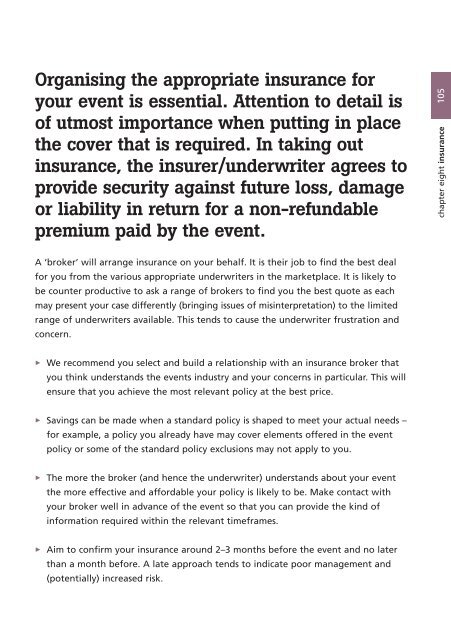EventScotland Events Management - A Practical Guide
EventScotland Events Management - A Practical Guide
EventScotland Events Management - A Practical Guide
Create successful ePaper yourself
Turn your PDF publications into a flip-book with our unique Google optimized e-Paper software.
Organising the appropriate insurance for<br />
your event is essential. Attention to detail is<br />
of utmost importance when putting in place<br />
the cover that is required. In taking out<br />
insurance, the insurer/underwriter agrees to<br />
provide security against future loss, damage<br />
or liability in return for a non-refundable<br />
premium paid by the event.<br />
105<br />
chapter eight insurance<br />
A ‘broker’ will arrange insurance on your behalf. It is their job to find the best deal<br />
for you from the various appropriate underwriters in the marketplace. It is likely to<br />
be counter productive to ask a range of brokers to find you the best quote as each<br />
may present your case differently (bringing issues of misinterpretation) to the limited<br />
range of underwriters available. This tends to cause the underwriter frustration and<br />
concern.<br />
> We recommend you select and build a relationship with an insurance broker that<br />
you think understands the events industry and your concerns in particular. This will<br />
ensure that you achieve the most relevant policy at the best price.<br />
> Savings can be made when a standard policy is shaped to meet your actual needs –<br />
for example, a policy you already have may cover elements offered in the event<br />
policy or some of the standard policy exclusions may not apply to you.<br />
> The more the broker (and hence the underwriter) understands about your event<br />
the more effective and affordable your policy is likely to be. Make contact with<br />
your broker well in advance of the event so that you can provide the kind of<br />
information required within the relevant timeframes.<br />
> Aim to confirm your insurance around 2–3 months before the event and no later<br />
than a month before. A late approach tends to indicate poor management and<br />
(potentially) increased risk.



